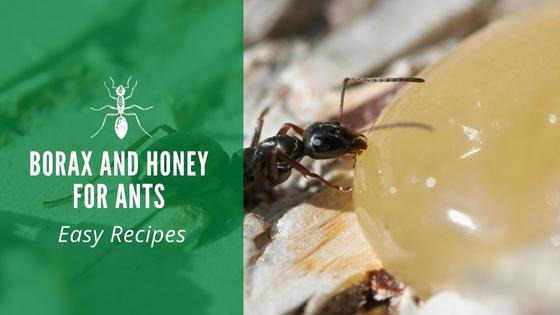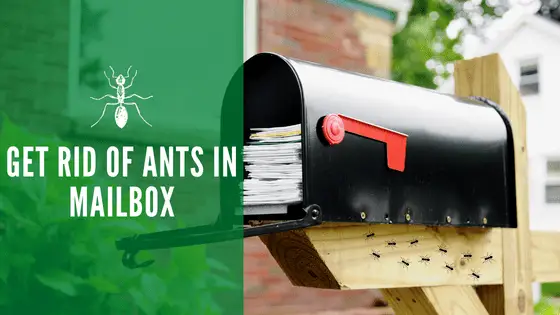Are Flying Ants Dangerous?
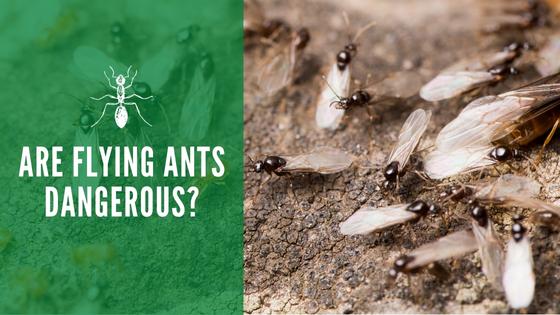
When you think of ants, you might picture them all walking in a fast-moving line like little soldiers. Most of the time, this is how you’ll see ants, and it can be a little daunting to see them flying around suddenly. Flying ants may or may not be dangerous depending upon what kind you are seeing around your property.
Why Do Ants Fly?
Most ant species will fly at some point in their life cycle. A flying ant is just one that is sexually mature, and they use their ability to fly to create swarms as part of their mating ritual.
While this is just a part of nature’s way of helping ant reproduction, you’ll still want to consider several essential points about whether or not flying ants are a problem on your property.
Can a Flying Ant Bite?
A flying ant is usually more busy trying to mate than looking for someone to bite. Since the ants are flying around, they tend to be less aggressive.
They aren’t likely to be near a nest that could trigger a defensive response. You might also catch them in rapid pursuit of a mating partner, which makes you far less interesting.
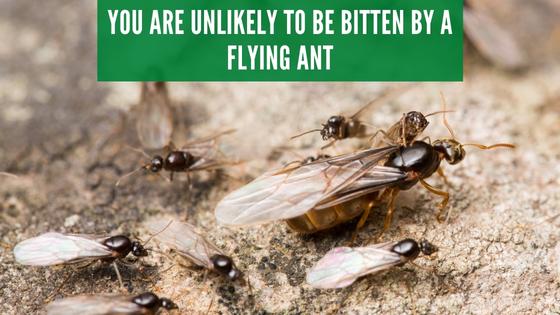
They might be busy, but a flying ant could have the potential ability to bite you if they are a species that harms people naturally. While flying ants may be using their wings, they still have mandibles that they can use to bite your skin. Ants that sting also retain their ability to use their stinger.
You’ll still need to practice caution around flying ants, especially when they might be sitting still or crawling along the ground. If one lands on your skin, then take action to move it away from you as safely as possible.
Should I Worry About Flying Ants?
Most flying ants are more of a nuisance than a danger, but you do need to consider the possibility of having a wood-damaging pest infestation.
Flying ants are at the height of their reproduction cycle. Those swarms are actively creating new flying ants that will inhabit your property.
If the flying ants are the type to bore into wood, then you might be on the hook for covering the cost of replacing damaged building materials that the ants create as they build their colonies.
There is also the risk of an infestation occurring in parts of your property that you don’t see. If carpenter ants destroy enough of the interior walls or roof, then you could experience a dangerous collapse in parts of the building that people inhabit.
Some people are also sensitive to ants. Flying ants are more mobile, meaning they could end up in your bedroom or other places on your property where people spend their time. If someone has an allergy, they could end up with a rapidly swelling and painful bite.
As a general rule, you’ll want to consider flying ants dangerous since you can’t always be sure of the type or whether or not someone nearby might be sensitive to their bites and stings.
When Are You Most Likely to See Flying Ants?
The concept of a Flying Ant Day seems pretty terrifying, but this is exactly what some people have noticed in London and other parts of the world.
Although there isn’t a specific day when you can expect to see flying ants out and about, there are some telltale signs that swarms could be emerging.
Flying ants tend to show up more often during the late summer and early fall when their mating season hits full swing. They also appear more often after a change in the weather, and they’re especially known for flying around the day after heavy rainfall.
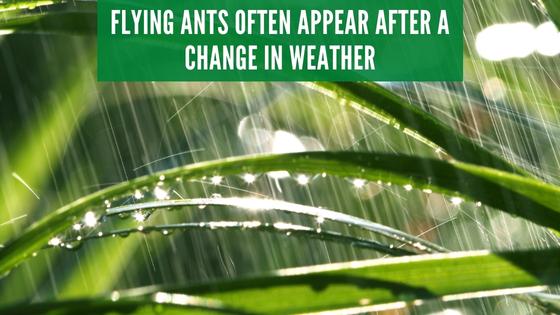
In most seasons, a peak in flying ant populations only lasts a few days. However, that doesn’t mean that the ant problem is over. Mated queens will go on to remove their wings and go to their nests to lay eggs. Males may only live for a few days, but new little ants replace them once they hatch.
How Do You Deal With Flying Ants?
A simple fly swatter probably won’t get you very far when you are dealing with large swarms of flying ants. Nor will using dusting powders help much when the ants are flying high in the sky.
Spraying for ants on your property is the most effective way to eliminate an ant infestation, and residual sprays will continue to work long enough to kill off the emerging new ants as they hatch.
Remember that you’ll also want to ensure you are dealing with ants. Termites require other special treatments.
For serious infestations, you’ll want to have a pest professional identify the source of the nest. This can help you ensure that the pest control methods are used where the primary problem occurs.
You can also practice good overall ant control around your home or business. Keeping food spills cleaned up helps avoid attracting ants to your property that will eventually mate and spread the infestation.
If you see a couple of flying ants around your property, you can safely assume there will soon be more. Fire ant queens can lay up to 800 eggs per day, turning into mature ants within a couple of days to weeks.
What’s the Difference Between Flying Ants and Termites?
Flying ants are often confused with termites. Carpenter ants and termites have wings, but the ones on a termite will all be the same size. The hind wings are shorter than the front ones on a carpenter ant.

Flying ants also have a defined waist, while a termite’s body is generally the same size from where the head ends to the tail. You might also notice a few behavioral differences between the two flying insects. Most notably, carpenter ants might be found in the open during the day. Termites tend to prefer to avoid light.
Termites and carpenter ants can destroy wood building materials, but there are some differences in controlling these pests. Identifying the type of pest you have on your property makes it possible to address the problem quickly.
Always take flying ants as a sign that you must immediately create a pest elimination plan. Whether you’re dealing with carpenter ants or fire ants, it’s not worth the risk to your property or health to let them stay.


